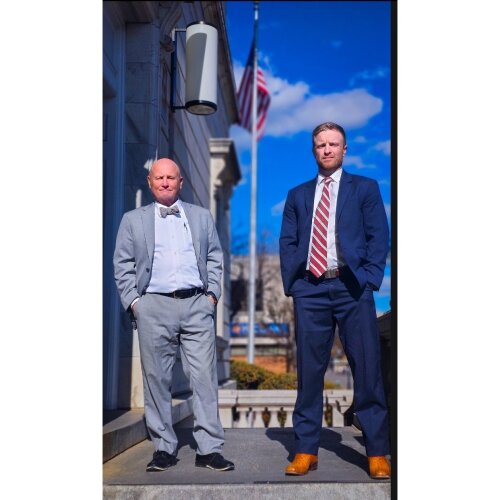Best Same Sex & LGBT Lawyers in Alabama
Share your needs with us, get contacted by law firms.
Free. Takes 2 min.
Free Guide to Hiring a Family Lawyer
Or refine your search by selecting a city:
List of the best lawyers in Alabama, United States
About Same Sex & LGBT Law in Alabama, United States
Same Sex and LGBT law in Alabama covers legal issues faced by lesbian, gay, bisexual, and transgender individuals and couples. Over the past decade, significant changes have occurred in federal and state laws impacting the rights and protections for LGBT people in Alabama. While federal law now recognizes same sex marriage and provides certain anti-discrimination protections, Alabama state laws and local ordinances may still present unique challenges for LGBT individuals and couples regarding family law, employment, healthcare, and public accommodations. Understanding the specific legal landscape in Alabama is essential for anyone seeking advice or assistance in this area.
Why You May Need a Lawyer
There are several situations where seeking legal help is especially important for those navigating Same Sex and LGBT legal issues in Alabama:
- Marriage, divorce, or adoption involving same sex couples
- Workplace discrimination or wrongful termination based on sexual orientation or gender identity
- Creating legal documents such as wills, powers of attorney, or healthcare directives specific to LGBT concerns
- Transgender legal issues, including name or gender marker changes
- Parental rights disputes or child custody matters
- Encountering discrimination in housing or public accommodations
- Seeking protection from harassment or hate crimes
- Ensuring legal recognition of parental rights from another state or country
- Navigating insurance, healthcare, or benefits questions that affect same sex couples or LGBT individuals
- Responding to religious objections or refusals of service in public or private settings
Given these complexities, an attorney familiar with Alabama's laws can help safeguard your rights and guide you through legal processes.
Local Laws Overview
In Alabama, same sex marriage has been recognized since 2015 following the United States Supreme Court’s decision in Obergefell v. Hodges. This ruling obligates all states to issue marriage licenses to same sex couples and recognize those marriages performed elsewhere.
However, Alabama has no statewide law that expressly prohibits discrimination based on sexual orientation or gender identity in private employment, housing, or public accommodations. While some cities and municipalities in Alabama have local ordinances extending protections, the coverage is not yet statewide. Federal protections through Title VII and the Fair Housing Act may still apply in certain circumstances.
Adoption is permitted by same sex couples in Alabama, but individuals may face bias or administrative hurdles depending on the county or agency involved. Transgender people can legally change their name and gender marker on certain documents, but the requirements can be complicated and may include court orders or proof of surgical transition, depending on the agency.
There are no explicit hate crime protections for sexual orientation or gender identity under Alabama state law, though federal law offers some protections. Alabama law also allows certain religious exemptions that can affect access to services or adoption placements.
Frequently Asked Questions
Is same sex marriage legal in Alabama?
Yes, same sex marriage is legal throughout Alabama as a result of the 2015 Supreme Court ruling.
Can private employers in Alabama fire someone for being gay or transgender?
Federal law, following the Supreme Court's Bostock v. Clayton County decision, prohibits most employers from firing someone for being gay or transgender. However, Alabama does not have a specific state law covering this, so legal protections depend on the employer's size and circumstances.
Are there state laws protecting LGBT people from discrimination in housing or public spaces?
Alabama does not have statewide laws that explicitly protect against discrimination based on sexual orientation or gender identity in housing or public accommodations. Some federal protections may apply, and certain cities have local ordinances.
Can same sex couples adopt children in Alabama?
Yes, same sex couples can legally adopt children in Alabama. Adoption laws are the same for all married couples, though application experiences may vary.
How can a transgender person change their legal name or gender marker in Alabama?
A transgender person can petition the court for a name change and, for some documents, may need to provide proof of surgical transition or court orders to update the gender marker. Requirements can differ by agency and type of document.
Are religious organizations allowed to refuse services to LGBT individuals in Alabama?
Alabama law permits some religious exemptions, allowing certain organizations and individuals to refuse services based on sincerely held religious beliefs. This may impact adoption agencies or wedding service providers, for example.
Can LGBT people serve openly in Alabama state government or public employment?
Yes, LGBT individuals can serve openly in state and public roles. Federal law provides employment protections, though Alabama itself does not specifically address protections in every context.
Are protections for LGBT students enforced in Alabama schools?
Federal law requires public schools not to discriminate based on sexual orientation or gender identity, but Alabama state policies vary and may not include explicit protections. School environments can differ significantly across districts.
Do hate crime laws in Alabama cover sexual orientation or gender identity?
Alabama’s state hate crime law does not cover sexual orientation or gender identity. However, federal hate crime laws may apply in some cases.
If I face discrimination or need legal help, what should I do first?
If you experience discrimination or have an LGBT related legal need, contacting an experienced attorney in Alabama is recommended. Keep records of any incidents and gather relevant documents. Many local and national organizations can also provide support and guidance.
Additional Resources
- American Civil Liberties Union (ACLU) of Alabama - Advocacy and legal assistance for LGBT rights
- Equality Alabama - Statewide organization supporting LGBT individuals and families
- Magic City Legal Center - Legal services focused on the LGBTQ community
- Human Rights Campaign - National information and resources, including Alabama specific updates
- Southern Poverty Law Center - Advocacy and legal research
- PFLAG Alabama - Support, education, and advocacy for LGBT people and their families
- Lambda Legal - Legal help and information concerning LGBT rights
- U.S. Equal Employment Opportunity Commission (EEOC) - Federal agency for workplace discrimination complaints
- Alabama Department of Human Resources - Guidance on adoption and foster care
- Local government offices for marriage licenses, name changes, and public records
Next Steps
If you believe your rights have been violated or you need legal support related to Same Sex and LGBT issues in Alabama, start by documenting your situation in detail. Seek out a knowledgeable attorney or legal service experienced in LGBT law within the state. Reach out to advocacy groups or legal aid organizations for resources, referrals, and potential support. Before meeting with a lawyer, gather any relevant documents, correspondence, and evidence.
Consultation with a legal professional can help you understand your rights, explore your options, and take appropriate legal action if needed. Taking early and informed steps increases your ability to protect yourself and your loved ones under Alabama law.
Lawzana helps you find the best lawyers and law firms in Alabama through a curated and pre-screened list of qualified legal professionals. Our platform offers rankings and detailed profiles of attorneys and law firms, allowing you to compare based on practice areas, including Same Sex & LGBT, experience, and client feedback.
Each profile includes a description of the firm's areas of practice, client reviews, team members and partners, year of establishment, spoken languages, office locations, contact information, social media presence, and any published articles or resources. Most firms on our platform speak English and are experienced in both local and international legal matters.
Get a quote from top-rated law firms in Alabama, United States — quickly, securely, and without unnecessary hassle.
Disclaimer:
The information provided on this page is for general informational purposes only and does not constitute legal advice. While we strive to ensure the accuracy and relevance of the content, legal information may change over time, and interpretations of the law can vary. You should always consult with a qualified legal professional for advice specific to your situation.
We disclaim all liability for actions taken or not taken based on the content of this page. If you believe any information is incorrect or outdated, please contact us, and we will review and update it where appropriate.
Browse same sex & lgbt law firms by city in Alabama
Refine your search by selecting a city.
















